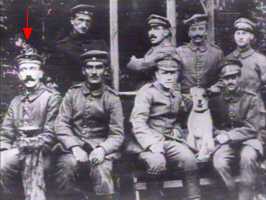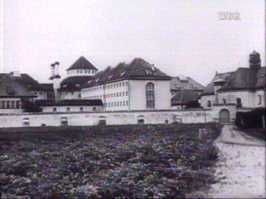Adolf Hitler one year in Jail, |
|
Adolf Hitler one year in Jail, |
|

 Hitler, Adolf (1889-1945)
An Austrian by birth, Adolf Hitler fought for the Germans in the First World War and was awarded the Iron Cross.
In the aftermath of war he was drawn into extreme right wing politics in Bavaria, joined and then took over the
'National Socialist German Workers' Party' [N.S.D.A.P. or 'Nazis'].
The Nazis attempted to seize power in 1923, but the coup d'etat was crushed by the police and army.
Hitler gained power by constitutional means on 30 January 1933 when he was elected Chancellor of Germany.
Within eighteen months he was voted dictatorial powers and had inherited the Presidency.
His expansionism began with the acquisition of Austria in the Anschluss of March 1938 and the occupation of Czechoslovakia in 1939.
The take-over of Poland in 1939 triggered the start of the Second World War. By June 1940 German troops had occupied Paris.
In 1941 the war in the east began, with the attack on the Soviet Union. The series of failures from
east began, with the attack on the Soviet Union. The series of failures from Stalingrad to the Normandy landings of June
1944 led to an attempt on his life in July 1944. Hitler's suicide in his Berlin bunker on 30 April 1945 ended the Reich.
Hitler, Adolf (1889-1945)
An Austrian by birth, Adolf Hitler fought for the Germans in the First World War and was awarded the Iron Cross.
In the aftermath of war he was drawn into extreme right wing politics in Bavaria, joined and then took over the
'National Socialist German Workers' Party' [N.S.D.A.P. or 'Nazis'].
The Nazis attempted to seize power in 1923, but the coup d'etat was crushed by the police and army.
Hitler gained power by constitutional means on 30 January 1933 when he was elected Chancellor of Germany.
Within eighteen months he was voted dictatorial powers and had inherited the Presidency.
His expansionism began with the acquisition of Austria in the Anschluss of March 1938 and the occupation of Czechoslovakia in 1939.
The take-over of Poland in 1939 triggered the start of the Second World War. By June 1940 German troops had occupied Paris.
In 1941 the war in the east began, with the attack on the Soviet Union. The series of failures from
east began, with the attack on the Soviet Union. The series of failures from Stalingrad to the Normandy landings of June
1944 led to an attempt on his life in July 1944. Hitler's suicide in his Berlin bunker on 30 April 1945 ended the Reich.
![]()
End of World War I. 
Hitler served in the Bavarian contingent of the German Army, was hospitalized due to being poison-gassed and
was awarded the Iron Cross.
However an reconstruction of the german war industry was
once again planed.
After the First World War the Treaty of Versailles, laying down the terms and conditions of peace, was signed by the participants
on 28 June 1919. Germany lost territory and its armed forces were greatly reduced. It had to pay massive compensation for war
damage and admit its guilt for causing the war. These terms caused great bitterness in Germany and sowed the seeds for future
discord in Europe.
The Party changes its name to the Nationalsozialistische Deutsche Arbeiterpartei (NSDAP, the National
Socialist German Workers' Party). Its name is not yet abbreviated to `Nazi'. Among the new members are
men like Alfred Rosenberg, a refugee Baltic German, full of anti-semitism and anti-Bolshevism, and
Captain Rohm, still a serving officer, who brings in other serving soldiers and Freikorps men.![]()

The fortress in Landsberg am Lech, Bavaria Germany. This fortress served as a political prison; Adolf Hitler wrote Mein Kampf while imprisoned there in 1923–24, and numerous convicted Nazi war criminals were held there after 1945.
Mussolini, Benito (1883-1945)
Mussolini's Fascist Party grew in popularity at the end of the First World War and in October 1922 his supporters staged
the 'March on Rome'. Mussolini was initially the senior partner in the European Fascist movement and when Adolf Hitler began
his political career he did so in conscious imitation of the founder of the Italian fascist state.
This situation was soon to reverse. By the time Italy entered the Second World War in 1940 Mussolini's international importance was
in decline and his loud bombast could not disguise Italy's weak economy and her unpreparedness for war.
A meeting of the Italian Fascist Grand Council on 24 July 1943 passed a motion which gave the King control of the Italian armed forces.
On the following day Mussolini was arrested and imprisoned. His successor, Field Marshal Badoglio, surrendered to the Allies in September,
but three days later German troops seized Rome and rescued Mussolini.He was arrested on 28 April 1945 in Como by partisan forces and,
together with his mistress Clara Petacci and other fascist associates, shot dead and hung upside-down in a Milan square.

The demilitarization of the Rhineland was recognized as permanent and German, French and Belgian post-Versailles frontiers were mutually accepted. Finally, Germany was brought into the League of Nations. Stresemann, for Germany, seemed to have brought
Europe to an age of peace.
An atmosphere of optimism generated later talk of an 'eastern Locarno' to agree on German-Polish borders,
but this was something that no Weimar government dared do. While Strasser saw Locarno as an Anglo-French plot to use
the Germans as cannon fodder against the Russians, Hitler (in Mein Kampf) welcomed the idea of an alliance with
Britain against Russia. In 1935 (after Locarno had been reaffirmed at Stresa) Hitler openly announced German rearmament; in
March 1936 he renounced Locarno and sent troops into the Rhineland.
![]()